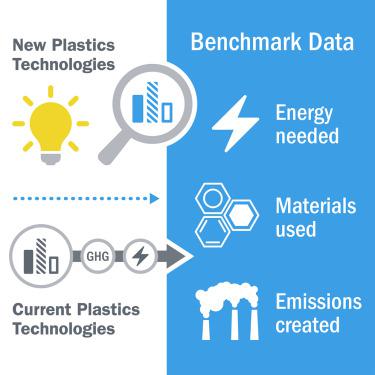Joule ( IF 39.8 ) Pub Date : 2021-01-20 , DOI: 10.1016/j.joule.2020.12.027 Scott R. Nicholson , Nicholas A. Rorrer , Alberta C. Carpenter , Gregg T. Beckham

|
Reducing the carbon intensity of plastics production by sourcing sustainable feedstocks while simultaneously enabling effective polymer recycling represents a potential transformation of 21st century manufacturing. To evaluate technologies that could enable such changes, it is imperative to compare the sustainability of bio-based and/or circular plastic flows to those of incumbent manufacturing paradigms. To that end, we estimate the supply chain energy requirements and greenhouse gas (GHG) emissions associated with US-based plastics consumption. Major commodity polymers, each of which has a global consumption of at least 1 MMT per year, account for an estimated annual 3.2 quadrillion Btutus (quads) of energy and 104 MMTCO2e of GHG emissions in the US alone. This study serves as a foundation for comparing the supply chain energy requirements and GHG emissions of today’s plastics manufacturing to tomorrow’s disruptive technologies, to inform the development of bio-based plastics and the circular economy for synthetic polymers.
中文翻译:

与塑料消耗相关的制造能源和温室气体排放
通过获取可持续原料,同时能够有效地回收聚合物减少塑料生产的碳强度表示21的电位变换ST世纪制造。为了评估可以实现此类更改的技术,必须将生物基和/或圆形塑料流的可持续性与现有制造范例的可持续性进行比较。为此,我们估算了与美国塑料消费相关的供应链能源需求和温室气体(GHG)排放。全球每年至少消耗1 MMT的主要大宗聚合物估计每年约占3.2万亿Btutus(quad)能源和104 MMTCO 2e仅在美国就产生了温室气体排放量e。这项研究为比较当今塑料制造的供应链能源需求和温室气体排放与明天的破坏性技术奠定了基础,从而为生物基塑料的发展和合成聚合物的循环经济提供了信息。



























 京公网安备 11010802027423号
京公网安备 11010802027423号